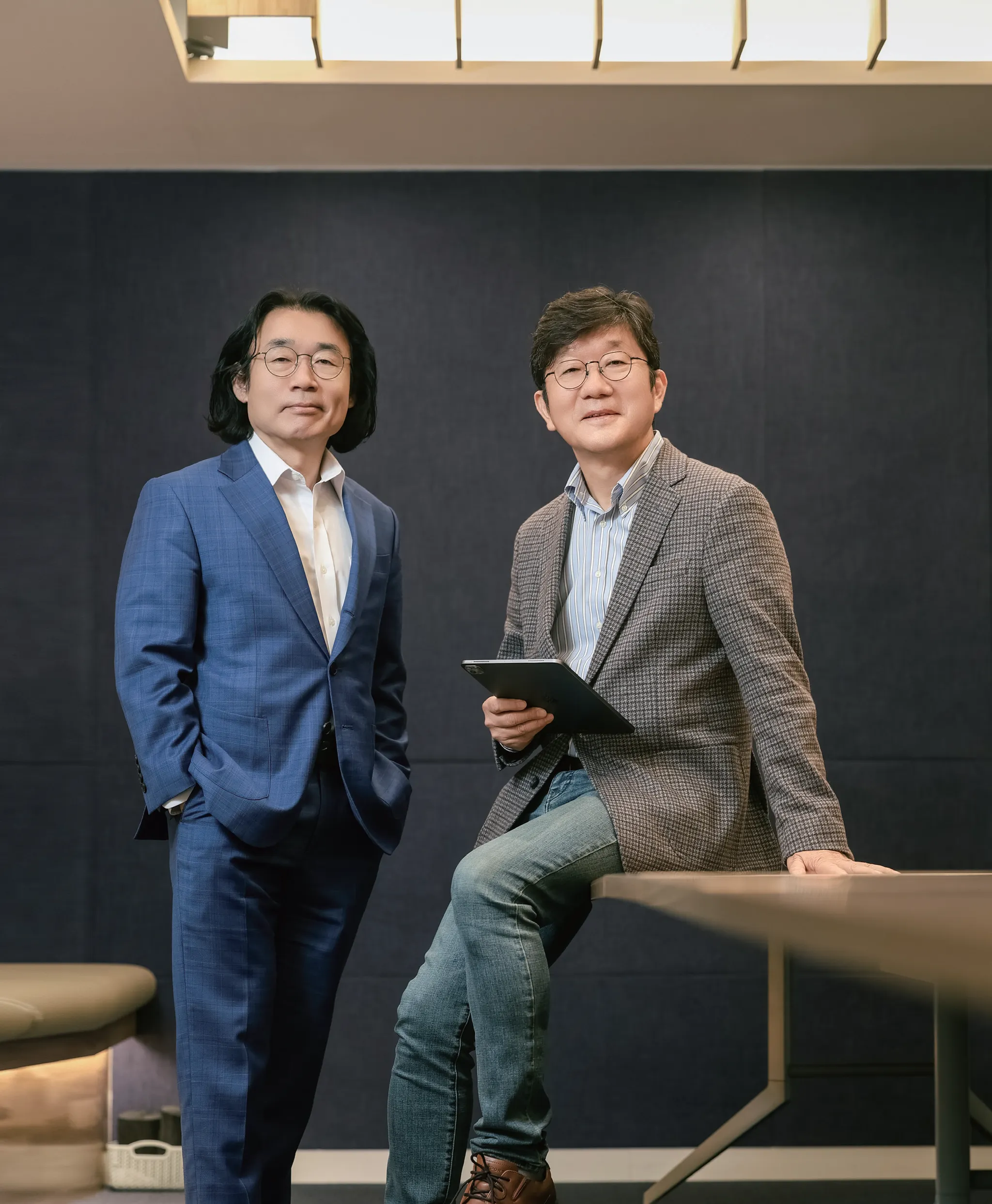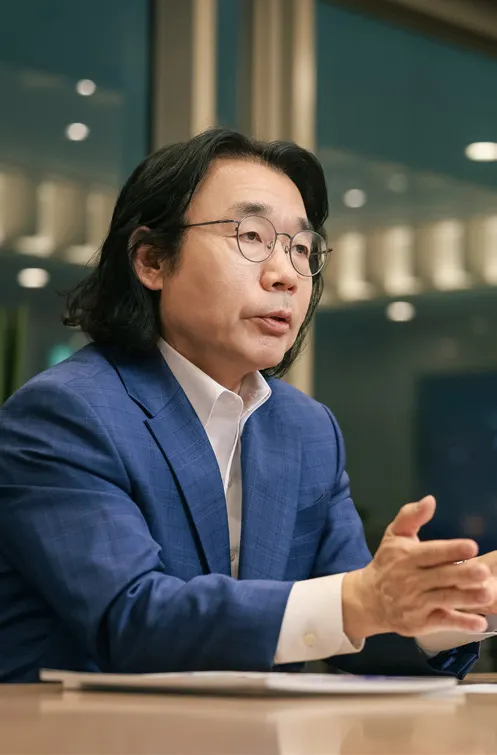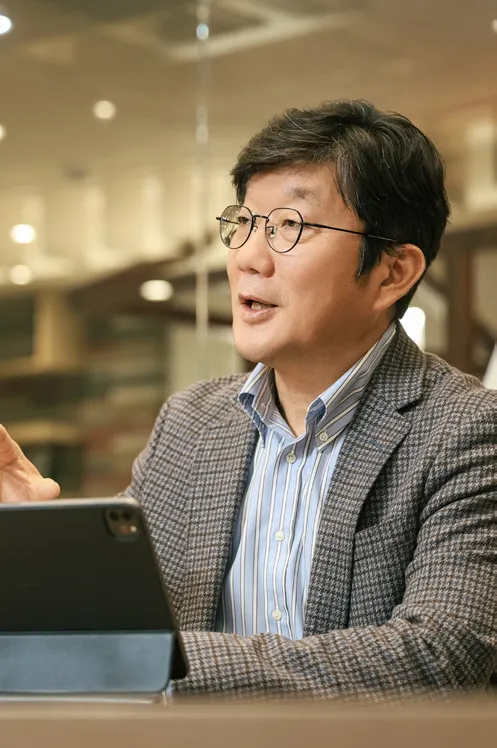Company K Partners has been recognized as a leading investor in the space sector, having identified and invested in the potential of the private space industry early on. Since 2018, the firm has invested a total of 30.7 billion KRW in 12 space startups, successfully taking three of them public. Recently, Company K Partners was selected as a trustee operator for the "New Space Fund," a 10.5 billion KRW fund established with contributions from the Ministry of Science and ICT's fund of funds. Kang-Su Lee, who leads investments in space startups at Company K Partners, and Byeong-Seon Lee, the director of JCCEI, discussed the possibilities and future direction of the space industry.
Written by Won-Bok Lee Photos by Seung-Jin Hong
Kang-Su Lee, CEO of Company K Partners & Byeong-Seon Lee, Director of JCCEI
The Second Wave of the Space Industry Has Arrived
Byeong-Seon Lee ━ Hello, thank you for taking the time to meet today. It seems like you've been incredibly busy lately. The scale of the space industry is growing rapidly, and Company K Partners has been actively investing in the aerospace sector. What drives this focus?
Kang-Su Lee ━ It's because we're committed to investing in industries with high growth potential, and aerospace is one such area. Personally, it's a field that I find fascinating, and the space industry is brimming with limitless possibilities.
Our first space startup investment dates back to 2018 with Lumir, a satellite development company. At that time, the concept of "New Space" was not well-known in Korea, although New Space companies were already gaining significant traction in the U.S. Anticipating the expansion of the space industry, we invested in Lumir. Starting in 2020, the emergence of numerous space startups in Korea has allowed us to expand our investment portfolio actively.
Byeong-Seon Lee ━ I heard some exciting news recently. You've established the New Space Fund, valued at 10.5 billion KRW, as part of the Ministry of Science and ICT's fund-of-funds initiative. What changes do you foresee for the domestic space industry?
Kang-Su Lee ━ The New Space Fund is designed to foster the growth of the space industry. The government plans to expand the fund to approximately 50 billion KRW by 2027. Its significance lies in its role as a catalyst for space industry development. Given the limitations of government budgets, this substantial investment demonstrates the government's strong commitment to nurturing the New Space industry.
Byeong-Seon Lee ━ You've also invested in major space startups such as Innospace and Contec. Contec, in particular, has a connection with JCCEI, having received seed funding through the center.
Kang-Su Lee ━ To date, we've invested around 30 billion KRW in 12 space startups. Some of the standout companies in our portfolio include those you mentioned. We invested early in Innospace, much like Lumir, while our investment in Contec came relatively late during its Series C round. Contec was well-prepared from the outset, so despite the late-stage investment, it quickly achieved a public listing.
Last November, Contec was listed first, followed by Innospace in July this year, and Lumir in October. The consecutive IPOs of our space startups have drawn significant attention to New Space. All three companies have now become exemplary success stories in this field.
Kang-Su Lee, CEO of Company K Partners
The Future Map of the Space Industry
Byeong-Seon Lee ━ The space industry is generally divided into upstream, midstream, and downstream sectors. Does Company K Partners focus on any particular segment?
Kang-Su Lee ━ Each sector has its own distinct characteristics. While the upstream sector is relatively smaller in market size compared to others, it is strategically crucial. Startups such as Innospace, Perigee Aerospace, and Unastella are developing competitiveness based on their proprietary small launch vehicle technologies.
In the midstream sector, services that collect and analyze satellite data are pivotal, creating significant added value in areas such as telecommunications, environmental monitoring, and Earth observation. The downstream sector, on the other hand, emphasizes data utilization. Communication services, in particular, are expected to experience substantial growth as they integrate with 6G technologies.
All three sectors are essential to the space industry, and balanced development is vital to creating a solid foundation. Additionally, one cannot overlook the importance of space exploration. For instance, the budget for space exploration in next year’s Korean Aerospace Administration has significantly increased, reflecting its importance as a future driver of growth. While this field is still largely government-led, private-sector participation will inevitably expand in the coming years.
Byeong-Seon Lee ━ Advanced countries have been investing in various areas of space development for a long time. Some argue that it’s inefficient for latecomers like Korea to invest in space development. What is your perspective on this?
Kang-Su Lee ━ Compared to countries like the U.S., China, and India, which started investing in space early, Korea has indeed been slower in terms of scale and speed. Recently, India’s spacecraft landed on the moon’s south pole, and China has made remarkable progress, such as retrieving lunar rocks.
According to Morgan Stanley’s analysis, the global space industry is projected to grow to $350 billion by 2030 and $1.1 trillion by 2040. Domestic experts share a similar outlook. This is precisely why Korea needs to act now.
The potential benefits of utilizing space orbits are vast. In Korea, the space industry is inseparably tied to the defense industry, highlighting its significance. Furthermore, the demand for space-related industries is evident as they can drive innovation across sectors such as environment, telecommunications, economy, defense, and trade.
Byeong-Seon Lee ━ I heard you recently attended the International Astronautical Congress (IAC). What were your impressions of the global space industry's trends, and how active were Korean companies?
Kang-Su Lee ━ That’s correct. This year’s IAC recorded the highest number of attendees in its history, underscoring the growing global interest in the space industry. Major players like the European Space Agency (ESA), Germany, and Luxembourg participated on a large scale. Korean companies, including Contec, Innospace, and SaTRec Initiative, held significant exhibitions and drew considerable attention from international attendees. It was evident that Korea is establishing itself as a key player in the global space market.
Byeong-Seon Lee ━ It’s clear that you have a deep interest in the space industry. I’ve even heard that your childhood dream was to become an astronaut.
Kang-Su Lee ━ My dream is to ride a spacecraft developed by one of the companies I’ve invested in and travel to the moon. It’s not a distant dream. Korea has set ambitious goals to send a spacecraft to the moon by 2032 and to Mars by 2045. As the saying goes, “A journey of a thousand miles begins with a single step.” National support must continue, and all stakeholders—investment firms like us, JCCEI, and space startups—must increase their focus and efforts. I truly believe it’s achievable.
Byeong-Seon Lee, Director of JCCEI\
Startups Challenging the Cosmos
Byeong-Seon Lee ━ To gain a competitive edge in the space industry, startups need not only technological capabilities but also a deep understanding of the sector. As an investor, what would you advise startups aiming to enter the space industry to prepare?
Kang-Su Lee ━ The space industry is a deep-tech field where technological expertise is critical. Personally, I would like to see more professors and researchers from institutions actively participating in startups, whether by launching ventures themselves or joining as key contributors. Profound knowledge, advanced technology, and extensive experience are the backbone of competitiveness in the space industry.
For example, during the ‘Jeju Startup Ecosystem Forum X Investor Day,’ startups like SPEX and SpaceBeam stood out. Both have founders and core team members who are leading experts in their fields, resulting in highly competitive business models.
Byeong-Seon Lee ━ Absolutely. I, too, look forward to seeing how far SPEX and SpaceBeam can grow. JCCEI is also deeply invested in fostering space startups. What were your impressions of the ‘Jeju Startup Ecosystem Forum X Investor Day’?
Kang-Su Lee ━ This was my first visit to JCCEI, and it was clear that the center is making tremendous efforts to support the startup ecosystem. Beyond space startups, Jeju is home to many local startups leveraging tourism and natural resources. What’s particularly interesting is how Jeju’s unique resources also positively influence the space industry.
Skilled personnel are essential for building great companies, and today, the quality of living conditions in a workplace’s location is a significant factor. Consequently, industries less restricted by regional constraints are increasingly relocating their headquarters to Jeju. Several space startups have already set up bases here. With Jeju offering one of the best environments as a workplace, coupled with policies supporting talent inflow and development, the island can foster an even more robust space startup ecosystem. Jeju’s advantages in rocket launches and satellite communications are undeniable.
Byeong-Seon Lee ━ It seems like there’s much more for JCCEI to contribute to the development of the space industry. It’s a responsibility that I feel optimistic about.
Kang-Su Lee ━ The space industry requires a long-term perspective. As mentioned earlier, Korea’s goal is to send a spacecraft to Mars by 2045. By then, I likely won’t be actively working in the field. However, does that mean I should stop caring about the space industry? Absolutely not. It’s our role to pave the way for future generations so that they can innovate further in space. Policies and regulations must also be designed with a long-term vision, and I hope the public can share this perspective for the distant future.
Byeong-Seon Lee ━ Thank you for sharing your valuable insights today. I’m genuinely curious to see how the future of the space industry unfolds. JCCEI will also intensify its efforts to advance the space sector. Thank you.



